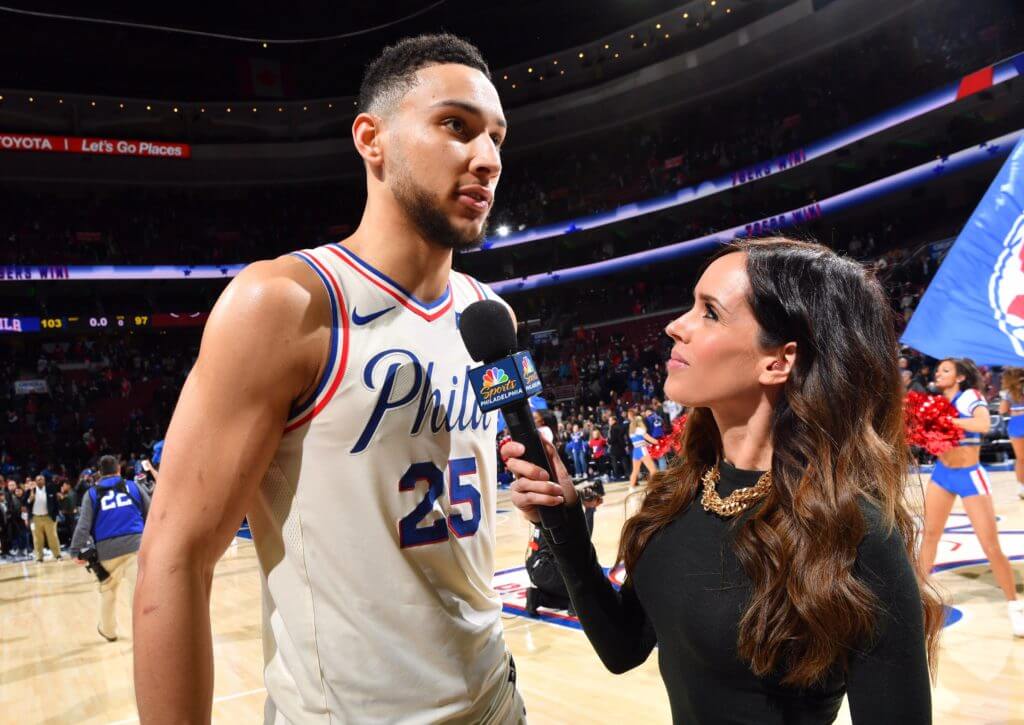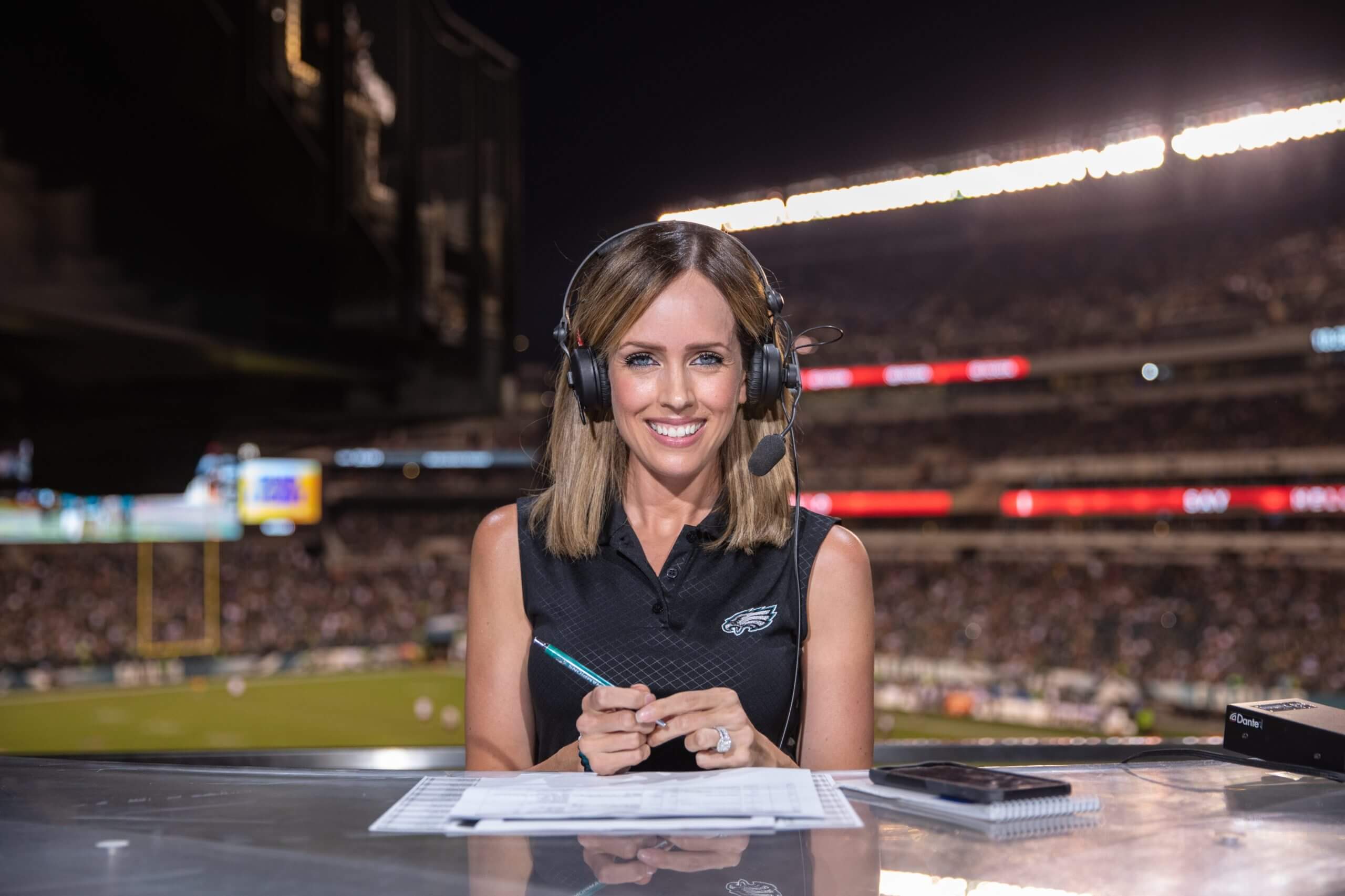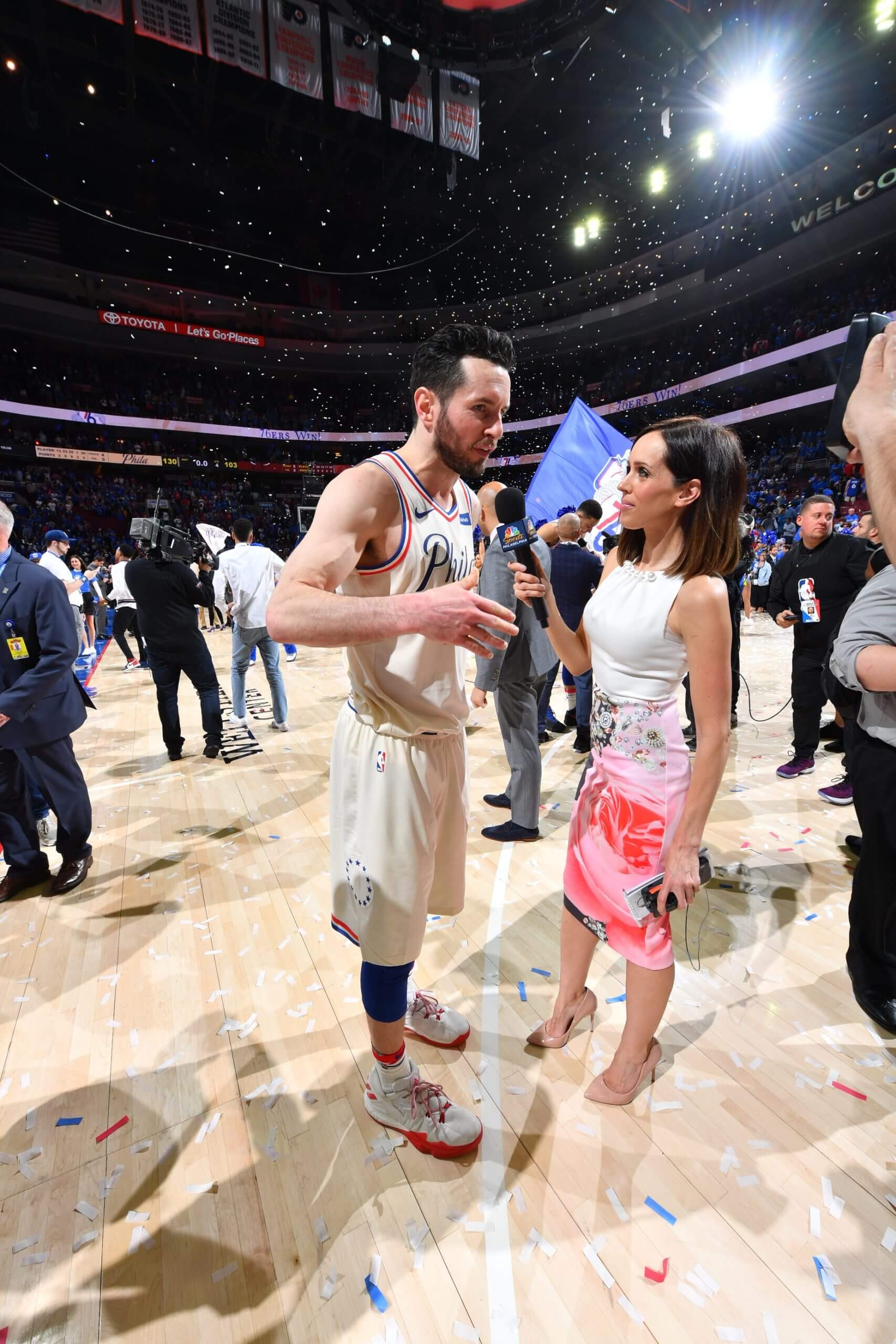Out of the Pool: Molly Sullivan on Distance DQs, Bad Basketball and Swim Parenting

Out of the Pool: Molly Sullivan on Distance DQs, Bad Basketball and Swim Parenting
When Molly Sullivan graduated from the University of North Carolina, she was looking for a place close to home to start her career in TV journalism.
Being a sideline reporter for Mountain West college sports sounded like a good gig … even if the position didn’t totally exist yet, or if they lacked a budget for it.

Photo Courtesy: Molly Sullivan
Sullivan pushed and made it a reality. In a career that has lasted 15 years, she’s gone from the sidelines of UNLV men’s and women’s basketball to nearly a decade on broadcasts in Philadelphia to network coverage of the NBA and NFL. She spent seven seasons with the Philadelphia 76ers, two with the Philadelphia Eagles and covered the arrival of the Raiders to Las Vegas for CBS affiliate KLAS. She’s worked for the NFL Network and Turner Sports, covering colleges, the pros and just about everything else.
The resilience and drive needed to succeed in journalism reminds Sullivan of the work she did in the pool, as an ACC champion distance specialist for UNC who qualified for NCAAs all four years and swam at the 2000 Olympic Trials. Competing with a mostly male reporting corps on the beat isn’t dissimilar to the time spent training with male distance swimmers at Santa Clara Swim Club.
Being around athletes to tell their stories is something that she adapted to from the beginning … after one little starstruck moment in her first game working for the Sixers in 2012 in Indiana.
“I look over and I see Larry Bird in the front row,” Sullivan said. “And I passed out pretty much. I don’t even know my first hit, I don’t know what I said, I hope I did the team justice.” (For the record, nearly a decade later, she casually and correctly tosses out that Lou Williams hit the game-winning bucket in overtime.)
Sullivan chatted with Swimming World recently about her career in journalism, which included a pretty impressive recall of old magazine covers that we swear we did not put her up to. (Interview has been edited and condensed.)
SW: I’ve been familiar with your journalism but not your swimming background. What are some of your favorite memories in the pool? And is winning an ACC championship up there?
Molly Sullivan: So my freshman year at Carolina, I can still recall at the time, I grew up in Las Vegas and my dad had flown out to the meet at the University of Maryland. I still recall his flight – I don’t know if the meet was running late or what was going on – but his flight, it was going to be down to the wire. I recall touching the wall and immediately not looking at my teammates, not looking for my time, nothing. I looked straight up to my father and his hand was up in the air and then bam, he was gone. I recall that freshman year, and that set the benchmark for my career at Carolina. I had a target on my back the rest of the time.

Molly Sullivan as a freshman at UNC; Photo Courtesy: Molly Sullivan
I qualified for NCAAs all four years – I think I am the only person in the history of swimming to false start in the 1,650 freestyle, which I did at NCAAs in Atlanta, my (freshman) year. (Editors Note: She was not even the only person DQed in the 1,650 that year.) I was going in and I had a heck of a year, I had a breakout season, I was just flying through the water. I had changed my eating habits and nutrition started to become more important to me and the work outside of the pool, I started to run, I had a heck of a year. And I false-started in the mile, so you don’t even get to know your time. That was the horrible thing and I recall, we were being drug-tested and my boyfriend at the time was there with my parents at the time and they tossed down a bag of Swedish fish as if that was supposed to help me.
I think I’m like that on the sidelines, too. I’ve always taken my role incredibly serious, whether as a student-athlete or a young swimmer growing up. I never took myself too seriously, and I thank my parents for that. But I always took swimming so serious, and when I got on that pool deck, the ability to keep my emotions in check, I had to learn and am still learning.
SW: I see you listed Janet Evans as a role model in your UNC bio. That seems perfect for that era. Have you gotten to do any stories on her since?

Molly Sullivan at Las Vegas Gold Swim Club; Photo Courtesy: Molly Sullivan
MS: She is such class. Growing up, Swimming World was the holy grail. Not only did you have scouting reports from meets across the country and globally, but the storytelling, that’s really where I gravitated to early on in my swimming career. I still think about the covers: I can still vividly see Janet Evans and she had this burgundy prom dress on one of the covers and it said “Swimming’s First Lady.” And there was Dara Torres behind the blocks and Summer Sanders on the beach with her hands on her hips and standing so confidently and with grace. Specifically with Janet Evans, she’s the epitome of class in everything she does. As I’ve grown in my career, we’ve connected at various points through social media and such, and to see her really champion 2028 in Los Angeles (she’s the chief athlete officer of that Olympics), now that I get it and I see value not only to the sport of swimming but to women athletes and just the human race, she carries herself with such class. The Janet Evans Invitational at USC is where I qualified for Olympic Trials. I always swam great at that meet. I would just get up for that meet every summer and I would swim out of my mind. I don’t know what it was, if it was rocking the Janet Evans Invitational shirt – I’ve still got them, and I’ll pass them down to my daughter – but she was it. She was the one, and continues to be. It’s one thing to just be a rock star in the pool, but she continues to not only champion women athletes but athletes as a whole, and now to see 2028 in Los Angeles and to see her doing her thing, she’s just the epitome of cool.
SW: As you embarked on your journalism career, do you think being an elite athlete offered any different insight in connecting with the athletes you covered?
MS: I don’t know, because we each have our strengths. For me, one of my strengths is also a weakness: I get very invested in the teams and the league and the people that I cover. And the people especially, I’ve always looked at the why of the people and the why of the results rather than the who and the what. I think anybody can talk Xs and Os, but I’ve always tried to separate my reporting by bringing out the real story, for the fans and the viewers, because I work for the person on the other side of the TV.
Make no mistake, the NBA is my first love. I was hooked with swimming from Day 1, the first day in the pool, but the NBA was my first love and swimming and basketball have always been intertwined throughout my journey, oddly enough. I think as a swimmer, I learned obviously the work ethic is one thing, but the discipline, perseverance and composure certainly serves me well not only in my career but now as a mom and trying to pass those lessons on to my daughter and help her understand the power of sports. At the end of the day, you strip everything down, and I’m a competitor and I want to throw some elbows in those scrums if I’ve got to get the soundbite or whatever I’ve got to do, and my colleagues and I will laugh about it.
Truth be told, I was not the best student growing up. I probably liked to play a little bit more than I liked to work, at least in the classroom, but I’m paying for that now because I’m constantly learning and studying and researching, I can’t get enough, whatever my assignment might be. (Right now, I’m diving into the sports betting side of the things and trying to learn an entirely new side of things because it’s no longer taboo.) But I think being a swimmer and understanding how to read a situation, I think anybody can cover a winning team, but when you cover a losing team, you’ve got to be able to read the athletes, read the coaches, read the front office, read the fans and have your finger on the pulse of what’s going on, so I think certainly being a swimmer has prepared me for that.

On an Eagles broadcast at Lincoln Financial Field; Photo Courtesy: Molly Sullivan
SW: Your career has taken you a lot of places. Are there a few highlights that stand out? And what has it taken to adapt to those new locales?
MS: I think what I’m most proud of is earning the respect and the trust of Philadelphia sports fans. They expect their teams to reflect the city in that they’re going to fight and they’d better play smart and they’d better never stop fighting, and they expect the same from their reporting. When I made the transition from the NBA across the street to the NFL (with the Eagles), my core values stayed the same. So yes the rules change in terms of Football 101, but at the end of the day, I’m still telling the story.
I’ve really enjoyed the NFL. I think the fact that everything matters, and in the NBA you’ve got so many games and there’s back-to-backs which I love because it’s just a continuation of the story, but in the NFL, you’ve got to pace yourself. When you’re a reporter and you’re in that locker room, you might not want to go in for the money question on a Tuesday because by the time you get to Thursday, these guys might be done with you and have nothing else. I think my time in the pool and staring at that blackline for 15 years, it has enabled me to stay disciplined and keep my priorities in check and have the strength to do what’s right and never let go of what matters most. Swimming, that’s where I learned it.
SW: You’ve done boxing and the NBA and the NFL, some very masculine environments. What does it take to have the toughness to be in those rooms and ask the tough questions?
MS: I feel such a great responsibility, and I’ve been told that I approach everything like it’s Game 7. And I used to think, gosh I’d better water down whatever I’m doing; I must be too intense. But as I’ve grown as a woman and as a sports broadcaster, I’ve realized, that’s who I am. I take everything very serious and I think having the composure and the grace to continue to tell the story even when it’s uncomfortable, if they’re losing, if they’re winning, whatever, at the end of the day, they’re human beings.
Often I was the only girl in the room, whether that room was a team charter with the 76ers, I was 99 percent of the time the only female on those flights traveling with the team. Often in the pregame or postgame scrums, I was often the only female when the Sixers were losing because there wasn’t a lot of people at all around them. But I never batted an eyelash at that. I never flinched, because growing up, I trained with all guys. I was a competitor and it’s not like I needed that, but it’s just where my career went.
SW: Among the teams you covered in Philadelphia was the 10-72 76ers in 2015-16. How does one cover one of the worst basketball teams in history every night?
MS: Well, there were lots of individuals to talk to, there was a revolving door during Brett Brown’s entire time with the 76ers. … On top of all of that, the winning, the losing, whatever, I was also pregnant that season, the entire season, so I was at week 36 on the 76ers’ final game, and I’ve got a photo where I was huge and I was waddling down the sideline and still telling the story and I’m very proud of that season.

Molly Sullivan, right, interviewing the 76ers’ JJ Redick; Photo Courtesy: Molly Sullivan
I think when the team is losing, and especially in a city like Philadelphia that demands that their team fights, you’ve got to figure out what’s really going on behind the boxscore. It’s just so lazy to wake up and flip through and look at the boxscore. What really happened? What was the real story? Certainly with Philadelphia, you can see those true sports fans that today lived through those days and now to see everything come to fruition and start to see the results of the foundation that was put in place even back in 2012 with Dougie Collins getting everything there, it was a still a foundation that has been in place for years.
Covering a 10-win basketball season when the guys have history chasing them was a season that I will never forget and I think at the end of the day, my compass is doing what is right, whether that is going in a direction of things that you value in your life or in your parenting. And in that season, doing what was right was telling the story and not giving up. I can recall that final game, I was 36 weeks pregnant and I was busting out stats galore in my notebook, emptying the notebook because this is it. A colleague turned to me and said, ‘what are you doing? It’s the last game. Enough.’ And I thought, gosh, no, these athletes are hustling and I’ve got a job to do.
SW: So now that you’re a mom (Isabella is about to turn five), are you ready to become a swim – or whatever other kind of sport – parent?
MS: Well I’m not teaching her (laughing). I don’t want that responsibility. I will take it up once she starts going into swim season. For me, the water has always felt like home, and I can see the pure joy in her eyes when she’s around the water, and that’s really cool. It’s a full-circle moment, it’s in her blood and I look forward to seeing how she reacts to the water. … I’m ready to be whatever kind of parent she wants me to be. I had this moment, two weeks ago, and you think about your kids and your kids as an adult. I think about my daughter as an adult and I think about the relationship I want to have with her and I think about the parent I hope she will be one day or the woman she’ll be one day and I think about the parent I want her to have right now from my standpoint so it’s important to be that parent today, whatever that may be. Kind of be where your feet are: I hope my feet are on a pool deck with her, but it’s important to be present in whatever she needs. She’s a competitor and that perseverance and discipline and composure, she’s got it in her blood, so I’m a proud mom.




This is a great interview with Mighty Molly. Bill Tramel & I had fun recruiting her due to the vast sports knowledge she & her family had at that time. Then she was a fine, disciplined, detailed swimmer for four years as a Tar Heel. Those qualities have served her well as a reporter. Go Heels!